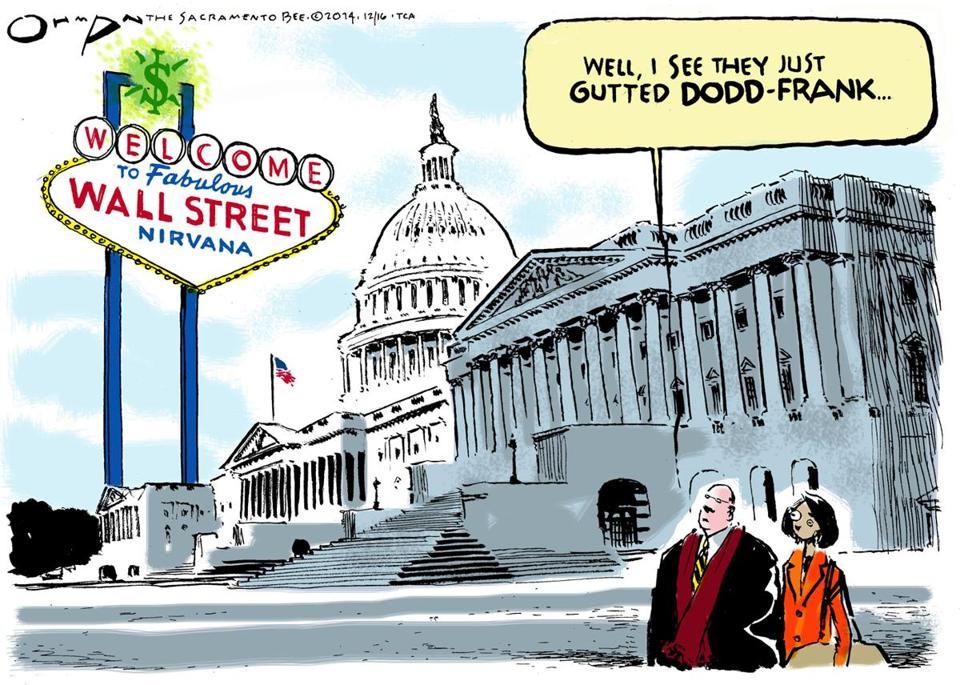Editorial House GOP targets financial cops –
Post on: 30 Апрель, 2015 No Comment

In case you have a short memory, here’s a quick refresher on the reckless behavior by banks that triggered the 2008 economic crisis from which the nation is still struggling to recover: Institutions gave mortgages to people who couldn’t pay them back, bundled those toxic loans and peddled them to unsuspecting buyers, and created complex insurance instruments that turned into financial weapons of mass destruction.
Sponsored Links
OPPOSING VIEW: Regulators don’t deserve a raise
In the wake of the debacle, Congress mustered the will to take on the powerful financial lobby and give more resources to banking regulators. But now, just four years after the crash, House Republicans are trying to deprive the regulators of the means to keep banks from once again putting the public at risk. That’s about as sensible as cutting back on police and prosecutors to prevent crime.
Last year, they moved to weaken the new Consumer Financial Protection Bureau by seeking to restructure it and deprive it of a leader, and they’re still trying to undermine it with unfounded smears.
Rate the debate
At other watchdog agencies, they’re going after budgets. Last week, for example, a Republican-led House Appropriations subcommittee voted to cut the Commodity Futures Trading Commission’s budget by 12% for 2013. even though the agency was given a huge new responsibility, to oversee the previously unregulated market for complex financial instruments known as derivatives — the sort of risky investments that just cost JPMorgan Chase more than $2 billion.
USATODAY OPINION
About Editorials/Debate
Opinions expressed in USA TODAY’s editorials are decided by its Editorial Board. a demographically and ideologically diverse group that is separate from USA TODAY’s news staff.
Most editorials are accompanied by an opposing view — a unique USA TODAY feature that allows readers to reach conclusions based on both sides of an argument rather than just the Editorial Board’s point of view.
Ostensibly, the cuts are intended to save money and reduce the deficit. A worthy goal. But consider this: The entire CFTC budget represents 0.008% of federal spending.

Republicans are using some fancy math to pretend that the agency’s job is now only a tiny bit bigger and that it has grown by leaps in recent years. Truth is, the agency will be overseeing a complex market eight times the size of its current portfolio with players that include the nation’s largest banks. Its size today — 700 employees — is only a bit bigger than it was two decades ago. More people will be needed to do the job right.
The story is similar for another watchdog agency, the Securities and Exchange Commission. Committee Republicans provided just one-fifth of the $245 million raise the Obama administration sought to enable the SEC to fulfill new duties under the Dodd-Frank banking reform law. What’s needed are more employees to enforce the rules. But the committee walled off the money to be used only for technology.
The critics have one valid concern: The regulatory regime is complex, which makes it both difficult to follow and difficult to enforce. A better approach might be the one that was used after the Great Depression: Bar federally insured banks from investment banking, with all its risks. Restricting the use of derivatives, which link financial institutions in ways that can cause them to fall like dominoes, is another option. Instead, they’ve been proliferating.
But that’s not what the bankers or their Republican supporters want, and regulation is the chosen alternative. Anyone who thinks monitoring is no longer necessary should have tuned in to Wednesday’s Senate hearing featuring JPMorgan Chase CEO Jamie Dimon.
Dimon testified that bank executives failed to properly oversee the unit that lost the $2 billion. He conceded that even the bank’s top executives didn’t understand their investment strategy, and that tough new banking rules he has vehemently opposed might have prevented part of the loss.
Does that sound like a reason to put fewer financial cops on the beat?
For more information about reprints & permissions. visit our FAQ’s. To report corrections and clarifications, contact Standards Editor Brent Jones. For publication consideration in the newspaper, send comments to letters@usatoday.com. Include name, phone number, city and state for verification. To view our corrections, go to corrections.usatoday.com.














